We recently went through our twice yearly period of communal venting called adjusting for daylight saving time (DST), or British Summer Time (BST) as it’s called in the UK. But why are we changing the time? Seriously, who caused all this? Does it do any good? Do we still need it? And what can we do about it? As it turns out, most of us want it, as you’ll see below.
We Live In Good Times
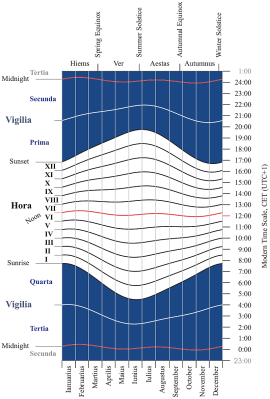
Fallacies of Daylight Saving Time
A common misconception is that DST is for helping farmers. However, farmers have actually opposed it. Farmers have to do much of their farming based on when the sun is up. Setting the clock back in the fall, which is harvest time, means less time to get crop to market. Cows also don’t adapt well to the change in milking schedule, but hired workers work according to the clock.
Another misconception is that Benjamin Franklin invented daylight saving time. In an anonymous letter, Franklin suggested only that his fellow countrymen work during daylight hours and sleep when it was dark. This was to save on the expense of candles during the early morning. However, he didn’t mention adjusting the clocks.
The first modern proposals for saving daylight came from New Zealand entomologist George Hudson in 1895 and independently, William Willett, a builder and outdoorsman in England in 1905. Both were fond of time spent in daylight outdoors in the evening. Hudson proposed advancing the clock by two hours on October 1st and back again March 1st. Willett, interestingly, proposed moving the clock by 80 minutes in increments of four 20 minute weekly steps. Neither succeeded in getting the changes to occur.
Going to War and Saving Time
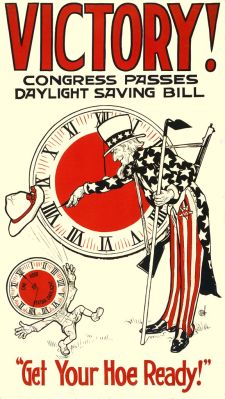
Wide adoption of the time change had to wait for World War I. In April, 1916 the German Empire and Austria-Hungary both were the first countries to adjust the clock forward in order to conserve coal. By 1918 many other countries had followed suit. However, with some exceptions, including Canada, the UK, France and Ireland, the practice was abandoned after the war. Over the years that followed various countries occasionally adopted and dropped it again, including during World War II.
In the US, from 1945 to 1966 there was no federal law regarding daylight saving time and so it was up to localities to decide if they wanted to keep using it. But in 1962, the transportation industry was finding the patchwork of different times problematic and pushed for federal legislation, resulting in the Uniform Time Act of 1966. As of 1967, standard time was mandated with time changes on the last Sunday of April and the last Sunday in October, though states could opt out.
The Uniform Time Act was amended in 1986 to have the daylight saving time last longer by having the change occur in the first Sunday in April instead of the last. Among the biggest lobbyists for the 1986 change were the barbecue grill and charcoal industries as well as the golf industry, all of whom would benefit from the extra outdoor evening activity.
Then in 2005 another month was added to DST in the US, this time by moving it to the 2nd Sunday in March and first Sunday in November. Lobbyists for the change included the Sporting Goods Manufacturers Association, the National Association of Convenience Stores (NACS) and, interestingly, the National Retinitis Pigmentosa Foundation Fighting Blindness (retinitis pigmentosa’s symptoms include decreased night vision). The NACS serves both convenience stores and the fuel retailing industry, the implication again being that having more leisure time in the evenings with daylight would cause more people to venture outdoors and away from home doing outdoor activities, benefiting those industries.
So in summary, why do we have daylight saving time? Initially it was to save energy resources during wartime. In the US it was later spurred on to clean up a patchwork of different times and more recently to benefit industries that make money from outdoor evening activities.
Do We Still Need It?
Some may say that with increasing technological and urban society, we may not need it anymore and that farming is becoming ever more automated. However, as we’ve pointed out above, the reasons for introducing daylight saving time have had to do with energy savings and encouraging evening outdoor activity, and not with farming.
Does it really result in an energy savings? In response to the 2005 change in the US, extending it by a month, a study was done by the Department of Energy for Congress looking at the effect 2007 had compared to prior years without extended daylight saving time. From analyzing data of the output of 35 utilities, statistical analysis showed an electricity savings of 0.03% of the total national electricity consumption of 3,900 TWh in 2007, amounting to 0.46% to 0.48% for each day of extended daylight. Comparing the regions, the North saved 0.51% and the South 0.42% daily. So though there are regional differences in savings, overall the savings is small.
The study also found through statistical analysis that there was no measurable impact on passenger vehicle gasoline consumption or traffic volume in 2007.
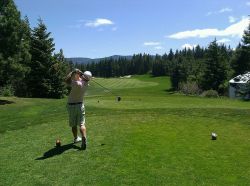
As for evening outdoor activity, one way to measure it is by TV viewership. Every year TV viewing in the early evening drops in lock-step with the clock going forward. This is measured with TV ratings in the US. Most telling is that this happens even for News shows, which have a fairly constant subject matter. In March 2015 it was reported that ABC, CBS and NBC evening news programs collectively lost three and a half million viewers compared to the previous, pre-DST week. Clearly people do take advantage of the extra hours of daylight.
If the numbers from convenience stores that sell gas are to be relied on, the 2005 change resulted in an added $1 billion in gasoline sales. Similarly, the barbecue grill and charcoal industries say they earn an extra $200 million.
So rather than say we still need daylight saving time, it looks more like we still want it, no matter how much we groan about adjusting the clock. We use it to go to sporting events, golf, or visit friends for a grilled steak. At least that’s what the data indicates.
Health, Happiness, and Even Crime
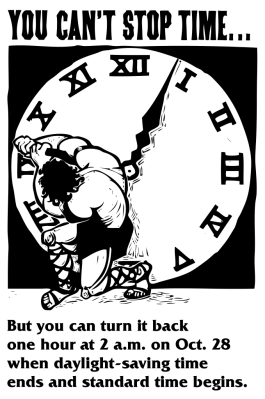
But that’s all to do with the latitudes of the US. At more northern latitudes such as those in Canada, England and even further north, Scotland, the winter hours become more of a focus. The shortest day in Edinburgh, Scotland, December 21st, is just six hours and 57 minutes long. People go to work in darkness and return home in darkness. In that case the argument could be made for keeping daylight saving time, called British Summer Time (BST) in the UK, all year round.
Daylight saving does appear to have an effect on crime. A 2012 study from Stanford University about the effect of the spring time change on crime found that robberies decreased by 40% when comparing the period with more evening daylight to that with less.
There are also studies that show it can have a negative medical effect. A study in Denmark of depression cases in psychiatric hospitals of cases from 1995 to 2012 found an 11% increase in severe depression during the period immediately after the change when the clock is moved back and darkness comes earlier at the end of the day, with a gradual decrease after 10 weeks. There’s also a study by the University of Alabama that found a 10% increase in the risk of a heart attack on the Monday and Tuesday following setting the clock ahead in the spring, some attributing it to sleep deprivation.
There are also multiple studies showing increased injuries in the workplace on the Monday following the switch to daylight saving time. One study by doctoral students at Michigan State University, analyzing injuries reported to the Mine Safety and Health Administration, found that on average 3.6 more injuries occurred on the Monday and 2,649 more days were lost as a result, a 68% increase.
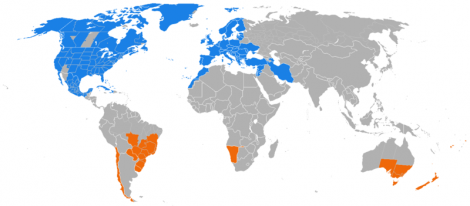
And what about the rest of the world? Some of us are so caught up in our obsession with these twice-yearly changes that we don’t realize that much of the world doesn’t make them, as the following map shows. The blue and orange are the areas that do make them (the different colors are for the different hemispheres), the light grey areas don’t anymore but did at one time, and the dark grey areas never have.
The Hacker Opportunity
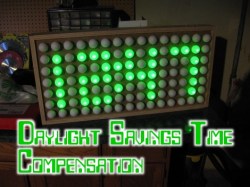
And so it appears there’s an opportunity here. We want daylight saving time for spending time outdoors in the evening but we don’t like adjusting our clocks. Who better is there to modify all those clocks to be self-adjusting than the Hackaday community?
Searching Hackaday brings up surprisingly little on this though. There’s a fix for a Heathkit clock that forces you to cycle forward only, fixing what would otherwise be a cumbersome adjustment. And then there’s our own fearless leader [Mike Szczys]’s automatic daylight compensation for his delightful Ping Pong Clock, and that’s about it! Where’s the robot arm that playfully reaches out from inside the cuckoo clock to give the minute hand an extra rotation? Or how about a master clock to rule all your other clocks so that there’s only the one adjustment to be made?
Conclusion
To end on a personal note, I like fooling myself in the fall by waking up without having adjusted the clock back, and then adjusting it back and being silly with delight at having gained an extra hour for the day. Conversely, I don’t like setting it forward in the spring — groan, lost an hour in my day. But I take advantage of the extra time cycling or reading outside in the evening. As I write this, however, it’s winter, 4:30 PM and it’s dark outside, and to keep active outdoors in the evening, I have to keep reminding myself that it’s not night. There clearly are both whys and why nots to this issue.

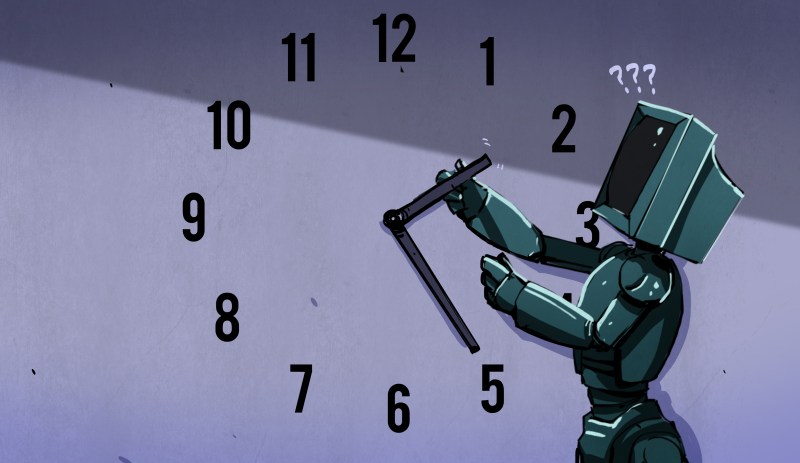













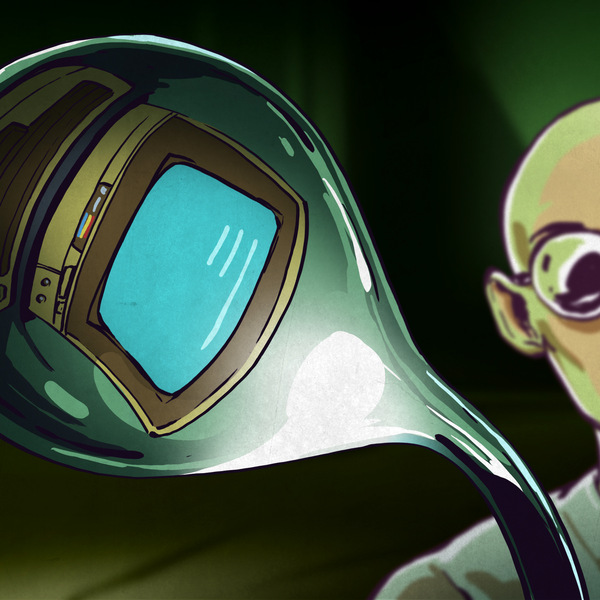
We can just use DST whole year. Some countries already done it e.g Turkey.
We did that during WWII. There was a marked increase in winter road accidents.
Source? I think DST year round would be incredibly helpful for sleep and less evening commutes in darkness which you would think would lead to less accidents in winter, not more.
The fact that the US went on permanent DST for the duration of WWII was called “War Time,” and is well documented.
I had a source for the traffic accident increase, but it’s been a few years and now I can’t find it. In any event, the extra hour of morning darkness combined with the blackout requiring headlights to be dramatically narrowed would make the concept self-evident. The only counter to it would be the general reduction in private car usage during the war due to gasoline rationing, but that wouldn’t necessarily have impacted the accident rate per passenger mile, and wouldn’t have impacted the accident rate for government and military vehicles.
Wouldn’t it be more reasonable to say the increase in accidents in the dark was due to headlight restrictions than to the change in darkness relative to time? It seems that reducing headlight output causing an accident spike is a rather obvious (and reasonable) cause and effect.
I would think U.S. coastal state blackout rules, which restricted lighting of all sorts, would be significant in night time accidents.
Which becomes significant when wintertime months include significant darkness in the morning because of War Time.
evening commutes are in darkness in winter anyway. DST in winter would not help against this, but morning commutes would be in darkness additionally, if you would keep DST in winter time.
Of course this all depends on latitude, I live around 48°N
This. So much this. I lived in AZ for a few years and most of the state doesn’t do the time change. So for half the year I’d be 3 hours different from home (MA) and 2 hours different the rest of the year.
I have a master clock to adjust all other clocks… a few of them actually… one of them is located in boulder colorado, broadcasting around 20Mhz… Another is orbiting with the GPS satellites… There are a few more on the internet acting as NTP servers…
Have the components (board with serial port, Garmin GPS). Now all I have to do is get off my butt and make that personal NTP server. As for the story, didn’t know the Brits had to put up with DST either.
https://hackaday.io/project/15137-raspberry-pi-gps-stratum-1-ntp-server
Interesting article. I agree on the brainwashing of the people by telling them (over and over – simplest for of brain-washing) that it was “for the farming community”.
On the GPS and NTP servers; GPS in particular, does not change time with each year’s ever-changing DST/SDT iterations. Some of you may recall that in “the old days”, popular clock/calendar IC’s (MM58174 and MC6818?) would adjust automatically on the last Sunday of March and the last Sunday of October. The GPS satellites are decades old and MUST be using these same “rad-hard” IC’s because they do not adjust with the “new format”. By varying the dates each year, unless I manually change them, my clocks are off by 1 one hour twice a year until they compensate at the hardware encoded adjustment dates of “last Sunday of March and the last Sunday of October”. There are many older hardware IC’s that are still operating in equipment to this day (I mentioned GPS). If I recall, even WWV adjusts on the “last Sunday of March and the last Sunday of October”.
It irritates me to no end to have to manually adjust the clocks on a different date each year and further baffles me as to the actual reason for doing so. Commercialism?? I can see that! The almighty dollar and man’s insatiable greed for profit (power for some?!!). By doing so, much equipment was essentially “sabotaged” by the change, including the orbiting GPS satellites. Again, I ask “why” was it not left alone so that these faithful hardware calendar IC’s could perform their faithful duty without human intervention as it was for decades prior???
Peace and blessings,
Johnny Quest
GPS satellites keep TAI – they don’t even track leap seconds (they do, however, report the accumulated total number of them so the receiver can correct). They don’t know or care a whit for DST or even timezones.
I did not know that. Thanks for sharing.
This biannual buggering around with the time is a great source of personal irritation for me that I could do without.
I agree. Circadian rythms cannot be commanded at will. The whole thing is just a giant nonsense.
Exactly. And each more year added to my life make the wither to summer switch more painful. I would prefer to use the winter time the full year. I fell it the more natural with midday light at around midday time.
I like the longer daylight hours in summer evenings, so DST is good. On the other hand I have more difficulties in getting up if it is dark, so it is very good, that we do not use DST in winter. I happily take the small irritations of the time changes for this valuable advantages.
“The study also found through statistical analysis that there was no measurable impact on passenger vehicle gasoline consumption or traffic volume in 2007.”
“If the numbers from convenience stores that sell gas are to be relied on, the 2005 change resulted in an added $1 billion in gasoline sales. ”
Those appear to be contradictory statements.
The Great Recession was going into full swing around 2007, perhaps because of this people altered their behavior and mitigated the impact of DST around that time?
I hate daylight savings time. It’s like the government wants me to be blinded by the sun rather unexpectedly as I merge onto the main road on my way to work.
As opposed to being blinded by the oncoming headlights as you drive to work in the dark.
If I’m being blinded by oncoming headlights, I’m on the wrong side of the freeway and have much bigger problems.
It must be great having a freeway onramp in your driveway and an offramp directly to your work parking lot.
What about being blinded by the Sun at the equinox’s on East-West roads? I think the NS/EW layout of roads is deadly. We should change them to NW-SE and NE-SW. If it saves just one life it will be worth it! (Dicks out for Harambe!)
http://www.reactiongifs.us/wp-content/uploads/2013/03/slow_clap_citizen_kane.gif
I don’t quite get it why adjusting the clock is necessary to spend more time outside. You can always go to work earlier and finish earlier, you don’t need to change the time for that.
Like it or not, many employers don’t consider that an option.
They could change the official hours for everyone – so if the work hours were 8 AM to 5 PM in winter, the standard work hours could go to 7 AM to 4 PM in summer. Same advantage of having everyone there at the same time; you’ve just moved the office hours instead of changing the measurement.
How is that functionally different? It just sounds like the libertarian version of DST.
As far as I can tell, the only real effect would be to have more people not know how messy timezones are, and writing buggy timezone handlers rather than giving up early and just using tz.
The difference is that software does not have to calculate DST at all, and all DST related special cases will just not exist.
DST doesn’t just switch time in spring and autumn, it also causes one missing hour and one duplicate hour. All events scheduled for these special cases need extra attention. Naive software will one time execute the event twice and one time not at all. Working with time is not as easy as people generally think…
That is something I very much cannot do.
All time is UTC.
I’ll wake up at 22:00, go to work at 00:00, go home at 08:00.
Midnight is 16:00, midday is 04:00.
I will need some time to adapt, sure, but then I’ll know date and time of every where in the world.
Very good idea.
And for DST thing, should just do things earlier or later.
People in Alaska all effectively use Juneau time. People in China all effectively use Beijing time. Ask the folks Nome and Chengdu how confusing that is.
Changing the clocks doesn’t affect the amount of time it’s daylight though.
As the UK invented time, it should stay on GMT.
Trollololol.
No, Time was invented by those nice folks who invented Space,
i think DST is funny because instead of people changing what time they do things, they decided to change time itself.
Makes it more easy :-)
So I like DST and for me the advantages are more valuable than the slight disadvantages of changing the clock.
^^ This, and for time zones too. If we just admitted that the time was the same (maybe minus the speed-of-light) everywhere, we’d learn to deal with the fact that people in the central US ate lunch at 6pm instead of noon. No biggie.
In Arizona, the land of the free, we don’t have DST and life is good. It can be a pain in the ass dealing with all the stupid switching around in the rest of the world though.
You’re at a more southerly latitude. DST makes a lot more sense in the North.
Saskatchewan is hardly a southern jurisdiction and they have happily done without DST.
Good for them. I only said that it made more *sense* at a more Northerly latitude.
And, by the way, there are 200,000 more people in PHOENIX than in the whole of Saskatchewan.
I lived in Arizona too. It was great not to have to set my clocks twice a year. But 9 months of the year (first eight months, Thanks Bush!), TV shows start on time, then when the rest of the country changes back to sane time, everything starts a hour late.
Also I work for a company on the East coast, and most of the time they’re 3 hours ahead of AZ and some of the time they’re 2 hours ahead.
So the bottom line is: even in what you call “the land of the free” (that’s a whole different discussion), daylight savings time is still a pain in the butt.
TV shows? I quit watching any network TV years ago. All the shows are pretty much the same over and over and full of stupid junk.
My TiVo makes the TV shows start when I want them to.
In this day & age isn’t the idea of time zones in general unnecessary? Why don’t we all just use UTC internationally and not expect that daylight happens at a certain “time”? Somehow we manage to get business done internationally across time zones today even w/o 7am in China being 7am in the USA. As a programmer, one of the hardest problems I’ve had to deal with is time conversion. Let’s end this nonsense!
Defining the time of day in terms of the local tropical day offers a certain uniformity in expectation and experience.
China is all one timezone. The whole county operates on Beijing time. Ask the folks in the far west how that works out for them.
That will probably happen right after the USA switches to the Metric system.
They have, the general public is just to stubborn to admit it.
I know, it’s what keeps me sane as an emigrant from Metric land :-)
We did that back in the 1970s. We just define metric measures in terms of customary units.
I just went through the exercise of writing DST handling code in C. Yes, it’s been done, but I sought a minimalist approach. The heart of it is a method to take a month and year and determine the date of the first Sunday.
https://github.com/nsayer/GPS_clock
Think of DST as a bad idea whose time has come and gone, sort of like the Electoral college.
At the risk of veering sharply off topic, the problem isn’t the electoral college. The problem is the winner-take-all system that 48 of the states use to divvy up the votes.
Take heed now, I am not trying to launch a political firestorm and get myself banned from Hackaday, just generally slinging mud at a pair of anachronisms and carefully avoiding taking any public position on recent events. I have been a long time critic of both DST and the electoral college, not to mention wringer washing machines.
No, it is a good thing. It’s advantages are worth much more than the slight disadvantages.
If farmers do their work when the sun is up regardless of the clock then why would they be opposed to it? surely they wouldn’t have an opinion.
As for driving in the dark it would be much easier to see if there were far fewer mobile discos allowed on the roads aka cyclists adorned with randomly flashing lights like a laser eye surgery Christmas tree.
The only real argument either way is that apparently children in indiana used to go missing when the clocks changed which is a scary thought.
Since we can all agree that the time on the wall is immaterial i agree with the above poster that we should all stick to GMT, why complain about adjusting your watch twice a year if you still have to do it whenever you change timezone? USA has how many timezones? Pure idiocy.
Wow, my head hurts.
As mentioned in TFA, Farmers have a lot of hired help who work standard hours.
Another angle on all of this, and that is to do what I do as much as I can, just ignore the clock and live by the sun. That is one of my premier goals in life, to get free from the clock. I understand some folks gotta clock in to work on a schedule and all of that, but it is something to strive to get free from. Instead of that dreaded alarm, crack the eyelids and see if there is light in the sky …..
Before the railroads, that was how time was done in this country.
Timezones and standard time were created because people were for-real being killed by train accidents caused by scheduling screw-ups caused by a lack of standardized time. DST was created because standardized scheduling led to a desire for that standardized schedule to maximize the scheduled activity that happened in daylight. The reason it’s not year-round is that when you do that, early morning activities wind up being done in the dark in winter, which is contrary to the goal.
Standardized time and DST, IMHO, solves more problems than it creates. Only just, perhaps, but still.
why not make dst the year round?
1. modern harvesters have lights so they can work around the clock even in the wee hours of the hight like 3 am
2a. school buses have lights and modern/latest models have daytime running lights so they can run in the dark.
2b. do a multi stage student delivery students that live in town can walk to school and parents can bring them students in the boonies parents can bring them students that has to be brought by bus can be brought by bus.
3. shorten the school day to all essential classes (music, gym art are non essential) and can be scrubbed during the shortest days where students may have to go outside you dont need to know how to play a french horn just to work at burger king or walmart you dont need to paint a picture or make a piece of ceramic to work at burger king and walmart.
4. essential classes can be shortened to fit the day
5. maybe lengthen the school year to the year round to make up for the shortfall in the winter.
shortest day sunsets at 4:30 pm and dark at 5 pm so dst year round puts sunset at 5:30 pm and dark at 6pm still plenty of time for any outdoor activities and walk from school.
shortest day sunrises at before 7:30 am and daylight cracking at about 7 am so dst year round puts sunrise at 8:30 am and daylight cracking at am.
ok so students may have to walk in the dark so put lights in the bus stops problem solved or move the school day up and abolish the breakfast at school.
People who live in rural areas where their kids stand out by a road to wait for the school bus don’t like having them standing out in the dark.
In this age of data and dare I say Uber, why are they waiting outside for a bus when they should know what time it’s arriving in advance ?
Well you don’t wave a magic wand and it happens, you convince taxpayers to pay more so the government can spy on them more effectively. (Because that’s what the argument will become, pay $$$ to get the systems, set them up maintain them, who’ll use the data, what if terrorists know to the second where to ambush the bus, yada yada…)
Yeah yeah, hackers can do it with 2 arduinos, a paperclip and a stick of gum, just don’t even try that argument until you have volunteered your services and actually implemented it for your local school district for free.
When I rode the bus, standing in the dark was better as drivers could see the flashing lights on the bus a lot better. . .
“(music, gym art are non essential)”
Good luck pushing that agenda… While I would also argue the necessity of gym, you will receive a HUGE fight back against trying to remove the arts from school.
Instead of messing with our clocks, can’t we fix the planet. Get rid of the tilt and the problem goes away. Any ideas?
Just live near the equator and you forget about the difference in day lengths. Humans adapt well enough to that climate.
Musk decided to go to Mars, but I’m not sure that will fix anything really…
Reminds me of a sci-fi story that I once read about this guy that had invented an inertia converter, that basically converts inertia into electricity. He takes his invention to a car manufacturer and they build it into all cars as an emergency stop mechanism. He casually mentions that if you’d make some modifications you could connect it to a wall socket and stop the entire planet from rotating. And he also mentions that he tested the system on electric trains but it took him a while before he could get the entire train from disappearing. There’s a back story where the inventor is in love with a girl or something, and there’s a rival who also wants the girl. He puts the converter in the rival’s car and rigs it so the car will disappear the third time he uses the system. The rival takes the car, thanks him for it, and drives away and pretends to try the system while he’s still in view of the inventor, but he didn’t really use it, he was just pretending, and when he gets home, he finds out about the rigged device and the inventor is in trouble. The story ends when the police are banging the door of his house while he quickly rigs another converter and plugs it into the wall.
I live in Northern region of Russia, at winter we have like 6 hours of sun at most, no clock manipulation will give you additional 6 hours of sun, so I glad we abandoned this archaic practice couple years ago. Savings argument sounds even more ridiculous. There is so many timezones in the world, why do we need to complicate it further?
Indiana proved by way of public utility records that Daniels Stupid Time (governor before Pence) causes more energy consumption. We are 1:45 off of solar time when DST. We used to be non-changing. Golf and bigwhigs.
The fact that time can be changed at will by the people only goes to prove that “time” is irrelevant. Sleep when you are tired. Eat when you are hungry. Play when you are bored. Work when the bill collector comes calling.
The thing that gets me is why it ever got set up the way it did.
If the shift was reversed, which I wish it was, it would get dark at 8:00 in the summer and 6:00 in the winter where I live instead of 9:00 and 5:00 respectively. That would be just fine. Better anyway. Mornings don’t matter ‘cuz yer at work anyway, so who cares if it’s dark or not for most of us.
Anyways, it has seemed backwards to me ever since I was a kid, which was a looong time ago. The way it works, seems like they set out to screw things up and over time kept making it worse – turning the knife?
Having the morning commute happen in darkness causes more accidents.
I prefer DST because it there’s enough daylight when I get home from work to get the things I want do get done outdoors. I have never found times zones a particular problem problem domestically. No doubt if I dealt with it internationally I would adapt quickly enough where it would be a problem. Going with UTC globally would play as much havoc on people local activities. in regards to available daylight when you desire daylight.
Do away with DST. It no longer serves a purpose. There is a reason why we don’t ride horses to work anymore.
No, keep it. It still serves the same purpose. Having more daylight in summer evenings with DST. In winter it’s dark anyway when you go out of the office, it does not help for this, but it becomes light in the morning earlier with “winter time”. So it is got to switch from DST to standard time in winter.
Just cry a little bit more, people. Just cry
The mid of the day is when the sun is at it’s highest point.
Pasta and Ramen!!!
What will be next?
Redefine the dates of the equinoxes and heliotropes based on some politics instead of physics?
I think I’ll throw up!
“Redefine the dates of the equinoxes and heliotropes based on some politics instead of physics?”
Why not. Some doofus’ re-defined “planet,” thus dis’ing poor Pluto. The worst part of it is that everybody went along with them when they were just wanting to get their names in some papers.
How do you think we wound up with the Gregorian calendar? They wanted the dates of the equinoxes (actually Easter, but that’s based on the equinox and lunar cycle) to stop drifting, so now we have a civil year that’s 365.2425 days long.